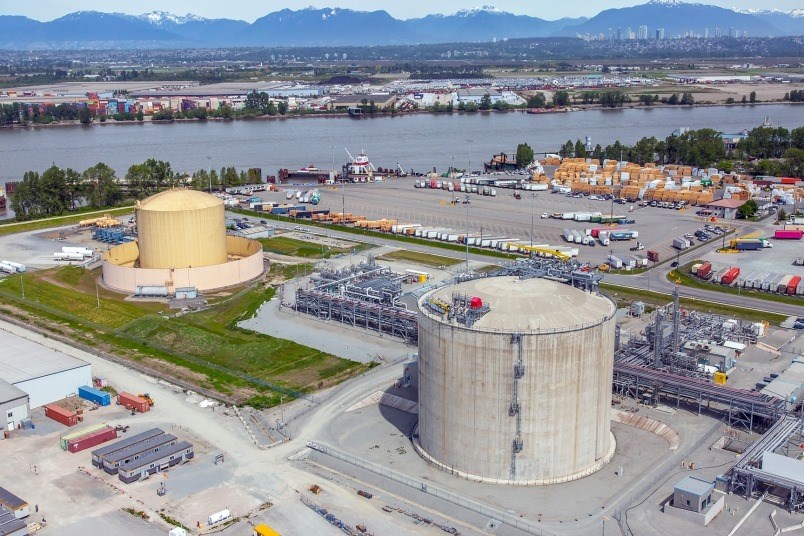Richmond city council is taking a stand against the expansion of the Tilbury liquefied natural gas (LNG) plant – located across the Fraser River in Delta.
They voted 8-1 to send a clear message to senior levels of government that the expansion isn’t welcome in their backyard, citing risks to the Fraser River, wildlife and air – a list of concerns were compiled by Richmond city staff about the proposed expansion.
At Monday’s committee meeting, only Coun. Alexa Loo opposed the endorsement of staff’s report - to be forwarded to provincial and federal environmental assessment agencies - and a motion to state council opposed the expansion.
Coun. Harold Steves asked staff to add concerns around breaches at the plant – either by “terrorists” or “crackpots” – who might cause a large-scale explosion that could have an impact on Richmond.
Steves referred to an LNG plant in Boston where, when a vessel goes in and out of the plant, the bridges are closed and police and army guard the roads.
“That’s why in the United States they don’t recommend having LNG anywhere near where people are living,” Steves added.
Coun. Kelly Greene noted the project is double the size of Woodfibre LNG in Squamish, and that the Society of International Gas Tanker and Terminal Operators recommends a 3,500-metre hazard zone around the shipping route and terminal.
“This is the wrong project for here,” she said.
Coun. Carol Day also suggested a meeting between council and federal and provincial environmental ministers to explain council’s opposition to the plant expansion.
“We are industrializing Fraser River and putting Richmondites at extreme risk with having LNG directly across from jet fuel – surely there’s more we can do to make the ministers understand what grave consequences could happen if ever there was an accident or spill,” Day said.
The upgrade to the LNG plant is planned to begin within two years and it will include a new storage tank and a marine jetty. The company says they don’t plan to expand any further although the Richmond report states they are pursuing an environmental assessment to access offshore markets by 2028.
The report raises concerns about the proposed volumes of LNG – this expansion would allow for a capacity of 163,000 cubic metres of LNG, an increase of more than 50 per cent from its current capacity.
Ian Finke, LNG operations director with FortisBC, said the plan is to have one vessel come to the jetty every five days, and the size is limited to 100,000 cubic metres of LNG – export ships usually carry 200,000 to 240,000 cubic metres of LNG, he added.
Currently, FortisBC trucks its LNG to ships where it’s used as fuel, for example, on BC Ferries vessels and has a series of transmission lines, one of which goes through Richmond.
Citing the volatility of LNG, the Richmond city staff report highlights risks to the community and the Fraser River in regards to spills, accidents, malfunctions and security breaches.
LNG is natural gas – largely methane – that is compressed by reducing its temperature to -162 degrees Celsius so that it can be stored and transported in a liquid form.
Finke pointed out LNG is stored in sealed double-walled containers that prevent oxygen from entering and igniting the fuel. Furthermore, any leak of LNG would just turn into a vapour that would dissipate into the air, he added.
“At the site itself, as we transport LNG, safety is paramount (with) many, many safety considerations at play,” Finke said.
Finke said LNG is one of the cleanest-burning fossil fuels, with 21 per cent less greenhouse gas emissions than other marine fuels currently being used.
It also emits fewer harmful gases and emits hardly any particulate matter, he explained.
“It does a good job of displacing higher carbon fuels, so from our point of view that’s a good thing,” Finke added.
But Richmond city staff note the project doesn’t align with Metro Vancouver air quality objectives and cites concerns about nitrogen oxide, carbon dioxide, sulfur dioxide, hydrocarbons and other particulates.
Light, noise and atmospheric pollution from the expanded plant are also a concern for local wildlife and the community, the report explains; furthermore, the expansion adds to the industrialization of the Fraser River estuary and its ecosystem.
“This project does not align with local, provincial (or) national strategies to reduce greenhouse gas emissions and reduce B.C.’s economic reliance on fossil fuels,” the city staff report states.
Finke said these are all considerations that they will look at as they move forward with the project design, which is only in its initial phase.



